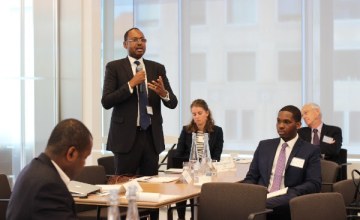This article is part of our blog series "Celebrating the African Business Narrative: Experiences from the Continent". Setting the stage for the Fall Forum, this series focuses on the challenges and opportunities that members of our Frontier Leader Network face when doing business in Africa. These stories were previously published on Devex as part of our "Changing Perceptions" series. The Forum will be held in Washington D.C. from October 19-21, 2015. *Editor's Note: Portions of this article have been edited.*
Is the news media killing American investment in Africa?
Bad press may well scare away investors, but booming economies in countries like Nigeria, Ethiopia and Ghana are changing the paradigm and attracting foreign investors. Africa now has nine of the world's 15 fastest-growing economies.*
"The opportunities in Africa are amazing," Dr. Mima Nedelcovych, president of the Initiative for Global Development said at a recent Voice of America newsmaker event. Nedelcovych pointed out that Americans stand to lose potential economic opportunities by failing to invest in Africa.
To address some of the misconception about doing business in Africa, Washington, D.C.-based IGD has launched a series of videos entitled "Changing Perceptions" on investment in Africa.
A SEA OF CHANGE IN AFRICAN JOURNALISM
Having grown up in Africa and worked as a journalist and project manager in the continent, it's difficult to convey just how revolutionary changes in African communications truly are.
The level of access to information is astounding in light of the near impossibility of communication in Africa just three or four decades in the past. This explosion in information access means Africans are taking coverage of the continent's affairs into their own hands. Increasingly, they are are interacting with people across the continent and abroad, exchanging information and ideas via radio, television, and social media and partnering on co-productions. AllAfrica.com is a prime example of a news source developed by Africans, for Africans.
In addition, the fact practically all of the continent's major newspapers are online allows for connections with the diaspora population. Now, a Tanzanian in Washington, D.C. or a Ugandan in Minneapolis can read their local African newspaper even if they are far away from home.
VOA has been eager to support this information revolution: In the past two years, the global broadcast institution's parent U.S. government agency, the Broadcasting Board of Governors, has signed agreements to put FM radio stations in Bamako, Mali; Bangui, Central African Republic; Juba, South Sudan; and N'Djamena, Chad.
Perhaps most excitingly, we are witnessing increased interest among women and young people in covering Africa's news. Expanded women and youth participation are providing African journalism with a breath of fresh air.
INVESTING IN A CONNECTED CONTINENT
But on the investment front, the United States still has a long way to go.
U.S. investments in Africa have fallen behind in relation to China and other countries, according to a recent article in the Financial Times. And while U.S.-Africa trade stood at about $110 billion in 2013, China was Africa's largest trading partner with about $200 billion.
Given that backdrop, U.S. Secretary of State John Kerry toured several African countries in May of last year*, urging Americans to get in the game. "We want more American companies to be here, to invest here — both to unleash the power of the private sector in Africa and to create more jobs in America," he said.
One of the hottest market sectors in Africa is communications. According to a report by GSMA Intelligence, the mobile economy supported 2.4 million jobs in 2013. By 2020, it's estimated to support 3.5 million jobs. Various sources also state that mobile penetration is expected to grow to 79 percent by 2020.*
"More people have access to Internet in Africa than they do to clean water, or even sanitation," says Samia Melhem, the World Bank's regional coordinator for information and communications technologies for Africa.
And technology hubs are springing up across the continent: "Nairobi, Kenya; Accra, Ghana; Lagos, Nigeria; and even Kigali, Rwanda are quickly becoming centers of innovation and entrepreneurship, catching the world's attention," the Huffington Post wrote.
Still, challenges remain for doing business. Corruption, repression, and the lack of basic press freedoms can all scare investors away. But as more people travel to Africa, work with Africans and better understand the continent, the news stories are sure to change.
- Read the blog series Celebrating the African Business Narrative: Experiences from the Continent
- Follow #Frontier100 and join the conversation online
- Learn more about this Fall's Frontier 100 Forum


